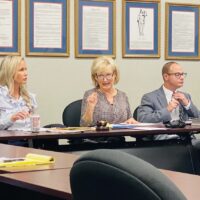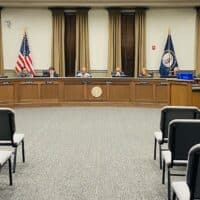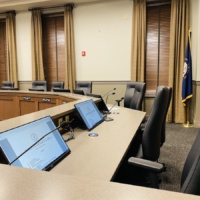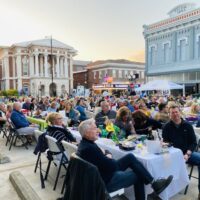Hopkinsville City Council doesn’t appear to have enough votes to override Mayor Wendell Lynch’s veto of a nonpartisan election ordinance that has been disputed largely along racial lines.
Under state law, the 12-member council needs eight votes to override the veto Lynch issued on July 10, City Attorney Doug Willen said Tuesday night at the council’s second regular meeting of the month.
Lynch said the veto is something that “should never be done loosely,” but he cited overwhelming reaction in the community to changing the city’s system of elections — especially during the coronavirus pandemic. He has said people need more time to understand how nonpartisan elections would affect the outcome of local elections. Previously, Lynch asked the council to allow him to appoint a committee to study the proposal, but his request failed.
The nonpartisan election ordinance passed 6-5 on second reading at the July 7 meeting, where a dozen residents spoke against the measure. All of the speakers were Black, as is Lynch. The council’s five Black members all voted against the ordinance. (Councilmember Jason Bell, who is Black, has said he supports nonpartisan elections, but he voted against the ordinance because he believed residents should be given more time to learn about the process.)
- SUBSCRIBE: Stay informed: Sign up for our newsletter
Several opponents said they believed nonpartisan elections would diminish minority representation and make it harder for minority candidates to win seats on the council. Historically, the city’s Black residents have been affiliated with the Democratic party. Hopkinsville is among the most racially diverse cities in Kentucky. Approximately 30% of city residents are Black, according to the U.S. Census Bureau’s estimate in July 2019.
Some of the speakers at the July 7 meeting said voters in their neighborhoods would have a hard time learning about candidates and their beliefs without the help of party affiliation. Many also opposed a change during the coronavirus pandemic and a time of civil unrest over racial inequality following the deaths of Black Americans in police custody this year.
Councilman Tom Johnson disagreed with opposition to nonpartisan elections and pointed out that everyone, regardless of party registration, would be able to vote in primaries if the city switches to nonpartisan elections, which the vast majority of Kentucky cities use. That would give voters more control in their wards, he said.
Currently in city elections, registered Democrats and Republicans cast ballots only within their party and their geographic ward in the primary. Independents and those who don’t have a party affiliation cannot vote in the primaries. In the general election, everyone votes in all 12 wards.
If the city switched to nonpartisan elections, voters would cast ballots only in their wards in the primary but candidates would not be identified on the ballot by party and all voters in the ward would be able to cast a ballot regardless of their party affiliation. The two ward candidates with the most votes in the primary would advance to the general election, when all voters would cast ballots in all 12 wards (as they do now).
Council members are elected to two-year terms. The mayor is elected every four years.
No council members commented on Lynch’s veto at Tuesday’s meeting.
In a memo sent to the council last week, the city attorney wrote, “The Mayor’s veto was returned to city council on July 10, 2020, within the required ten (10) day period set forth in the statute. If the council takes no action the ordinance will not take effect as a result of the veto. If the council wishes to override the veto, the reconsideration of the ordinance must take place no later than the second regular meeting after July 10, which would be the August 4, 2020, regular city council meeting.”
The council must have one more vote than a majority, “… which will be eight affirmative votes,” he added.
Citing the community’s interest in the question of nonpartisan elections, Lynch showed a graphic with the numbers of people watching and reacting to Facebook live stream videos of recent council meetings.
For all meetings so far in 2020, the average number of views and comments on Facebook was 516 and 11, respectively.
For the July 7 meeting, when the 12 speakers turned out to oppose the nonpartisan election ordinance, there were 5,200 views of the Facebook video and 641 comments.
Jennifer P. Brown is co-founder, publisher and editor of Hoptown Chronicle. You can reach her at editor@hoptownchronicle.org. She spent 30 years as a reporter and editor at the Kentucky New Era. She is a co-chair of the national advisory board to the Institute for Rural Journalism and Community Issues, governing board president for the Kentucky Historical Society, and co-founder of the Kentucky Open Government Coalition.





